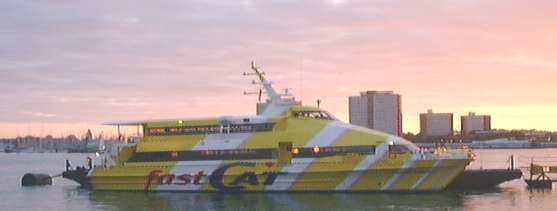
Fastcat Shanklin – 20 September 2000
Wightlink's new Fastcat Shanklin arrived in service from Ryde as PS Waverley departed Portsmouth Harbour for Folkestone on Wednesday 20 September. Fastcat Ryde was seen being prepared for service in the nearby Gunwharf Road car ferry terminal
There are conflicting stories regarding the final composition of the Wightlink’s catamaran fleet. One has it that a third vessel, to be named Fastcat Brading is awaiting delivery and that one of the existing vessels will be withdrawn. The other is that only two new vessels have been purchased and that Wightlink will retain both of the existing craft. Either way, other than in the most exceptional circumstances they should now be free of the need to charter smaller and slower vessels to cover for refits, breakdowns and summer Saturday peaks.

Fastcat Shanklin in Portsmouth Harbour on 11 September 2000
Fastcat Shanklin, registered in Portsmouth, is presently operating under an MCA letter of authority dated 14/9/00 pending issue of final certificates. This allows Class IV operation with 5 crew for 240 passengers and 6 crew for 361 passengers; script alterations to the letter reduce the crew numbers to 4 and 5 respectively.
The vessel has a saloon on the bridge deck and two saloons on the lower deck. The lower fore saloon offers a good forward view. The lower aft saloon has a refreshment servery which on 20/9/00 was open during the morning but was closed on the 1810 ex Ryde.
Fastcat Shanklin appears to be less handy at the piers than the Pamela and the Patricia. This may be due to crew unfamiliarity; it will be recalled that it took some time before the best way of handling the existing vessels was established. On the other hand it may be that the new craft, being of a design intended for operation on long distance services in Norway rather than on short runs with frequent pier calls, are indeed less manoeuvrable.
The design origins would also explain why the saloon seating layout in way of the entrances / exits is less suited to rapid loading and unloading than on the existing vessels. No doubt any teething problems such as these will be resolved in due course.
Jeremy Gold